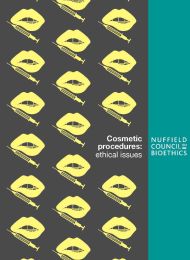Cosmetic procedures: ethical issues
Report
Published 22/06/2017

Conclusions and recommendations
Action to promote more ethical practice is required both with respect to ‘demand side’ influences that encourage people to consider cosmetic procedures, and on the supply of those procedures. Better data on the use of procedures, and more research to improve the evidence base, are both urgently needed in order to improve practice.
In 2016 Transport for London (TfL) amended its transport policy in order to refuse advertising that “could reasonably be seen as likely to cause pressure to conform to an unrealistic or unhealthy body shape, or as likely to create body confidence issues, particularly among young people”.
On the ‘demand side’, we conclude…
- The Advertising Standards Authority should follow the example of Transport for London in prohibiting advertising that is likely to create body confidence issues, or cause pressure to conform to unrealistic body shapes.
- Social media companies, including Facebook / Instagram, Snapchat, Twitter and YouTube, should collaborate to fund independent research on how social media may contribute to appearance anxiety, and how this can be minimised; and should act on the findings.
- Ofcom should consider the need for additional guidance under its Broadcasting Code with respect to the messages on body image and appearance ideals conveyed by makeover shows involving invasive cosmetic procedures.
- The Equality and Human Rights Commission should develop specific guidance on appearance-related discrimination, based on the requirements of existing equality legislation.The Department for Education should ensure that all children and young people have access to evidence-based resources on body image, through compulsory elements of the curriculum.App stores should exclude any cosmetic surgery games targeted at children.
On the ‘supply side’ we conclude…
- All the recommendations in the Keogh report should be implemented in full. We urge the Royal College of Surgeons to consider how best to continue taking a leadership role in supporting high standards in cosmetic surgery.
Access by children and young people
- People under the age of 18 should not be able to access invasive cosmetic procedures, other than in the context of multidisciplinary health care.
Empowering users
- The major providers of cosmetic procedures should collaborate to fund the independent development of high quality information for users; and to develop a code of best practice for the provision of cosmetic procedures.
Practitioners
- The Royal College of Surgeons, the General Medical Council, the major providers of cosmetic surgery, and professional bodies representing surgeons in the cosmetic sector, should work together to ensure that all surgeons undertaking cosmetic surgery are certified to do so, and can access necessary training.
- Public Health England should initiate a public awareness campaign to alert prospective users of cosmetic procedures to the importance of seeking practitioners who are 'quality-marked' through membership of a register accredited by the Professional Standards Authority.
Products
- The Department of Health and the Medicines and Healthcare products Regulatory Agency should require robust evidence of safety, and of effectiveness with respect to their claimed benefits, before devices used by cosmetic purposes (such as dermal fillers and implants) may be placed on the market.
- The Department of Health should bring forward legislation to make dermal fillers prescription-only.
- Until new standards are in place, insurers of cosmetic practitioners using dermal fillers approved by the FDA.
Premises
- The remit of the Care Quality Commission should be extended to all premises where invasive procedures are provided.
In 2013, the Medical defence union announced that it would only provide indemnity for its members when administering fillers if they used products approved under the US regulatory system by the FDA.

Share